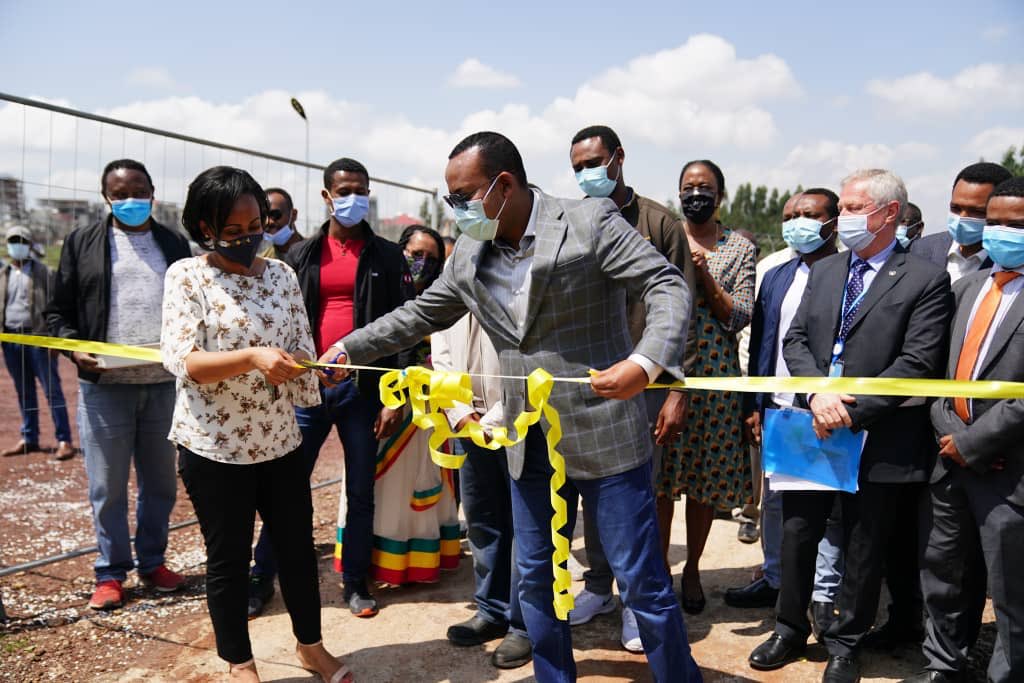ADF STAFF
Confronting a growing COVID-19 case load, Ethiopian leaders opened a new field hospital in the nation’s capital in September to treat the most-severe cases.
The Addis Ababa COVID-19 Field Hospital is equipped to serve 200 patients. It was built with the help of the World Health Organization (WHO) and the World Food Programme (WFP). St. Paul’s Specialized Hospital, which is also home to the St. Paul’s Hospital Millennium Medical College, manages the facility.
Prime Minister Abiy Ahmed cut the ribbon on the new facility in the city’s Bole Bulbula area. Patients were brought in for treatment almost immediately.
Health Minister Lia Tadesse said the hospital is prepared to meet the needs of the country’s sickest COVID-19 patients.
“It will provide care to patients with severe symptoms and is equipped with the necessary medical equipment improving our capacity,” the minister said at the opening ceremony. She added on Twitter that the facility will train emergency medical teams for the benefit of Ethiopia and the region.
The United Nations originally planned to use the hospital to treat its own workers serving in East Africa. But as Ethiopia’s COVID-19 cases began to climb, the U.N. turned the hospital over to the national Ministry of Health for its use.
In mid-September, UNICEF provided the field hospital with 100 of 380 oxygen concentrators donated to Ethiopia with financial help from the U.S. Agency for International Development and the United Kingdom’s Foreign, Commonwealth & Development Office. The concentrators are key components of treating COVID-19 patients who are struggling to breathe as the disease damages their lungs.
As of September 22, Ethiopia had reported more than 70,400 cases of COVID-19 and 1,127 deaths, according to the Africa Centres for Disease Control and Prevention. The country’s case load grew sharply in August and now runs at about 1,000 cases per day.
The WFP brought the field hospital from Norway to support WHO operations in Ethiopia. WFP erected the hospital and donated it to the government of Ethiopia, said Peter Smerdon, WFP spokesman.
Smerdon said the WFP’s logistical capability — its ability to move huge amounts of food and other necessities around the globe in short order — makes it a valuable partner for the WHO in fighting disease outbreaks. The WFP also was part of the 2014 international response to the West African Ebola outbreak, helping to set up clinics and treatment centers in countries affected by the outbreak.
“In addition, as part of the response to COVID-19, WFP has provided logistical services to deliver personal protective equipment and medical supplies for partners as well as providing passenger flights for frontline humanitarian staff when the lack of commercial air services meant there was no other way they could reach COVID-affected countries in need of assistance,” Smerdon said.
Field hospitals have become an important safety valve across Africa as COVID-19 infections threaten to overwhelm already fragile health systems. The hospitals remove COVID-19 patients from regular hospital traffic, reducing the risk to other patients and allowing medical staffers to concentrate on treating virus patients. Although the field hospitals are temporary, they’re often set up with the same quality of care and technology as an intensive-care unit.
Since the start of the pandemic earlier this year, field hospitals like the one in Addis Ababa have gone up in Ghana, Senegal and elsewhere to serve COVID-19 patients.
South Africa’s Western Cape government in June opened the Hospital of Hope, Africa’s largest field hospital, in Khayelitsha township near Cape Town, to treat patients in one of the hardest-hit parts of the country.
The 850-bed hospital was developed and staffed with the help of Médecins Sans Frontières (MSF) and constructed in the Cape Town International Conference Center. It opened June 1 and was nearly half-full the next day, according to MSF.
“We are here to help cope with a major humanitarian emergency,” Nompumelelo Zokufa, a health promotion manager with MSF in Khayelitsha, said in an MSF statement. “But we are not just talking about COVID-19. We are working to provide treatment for COVID while maintaining our services for people with two of the most prevalent chronic diseases, HIV and TB.”

